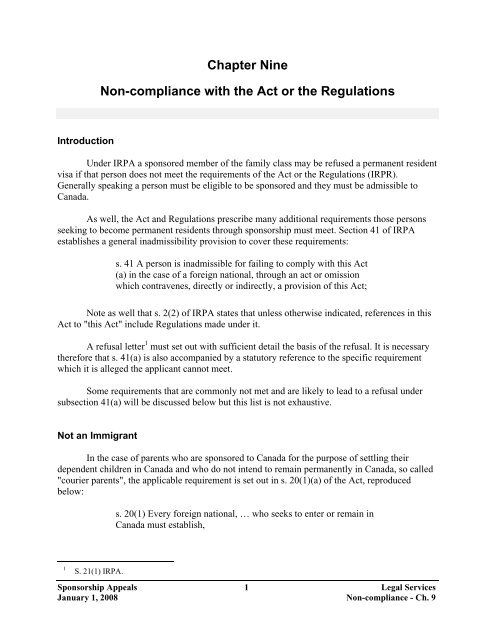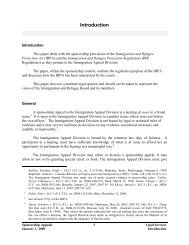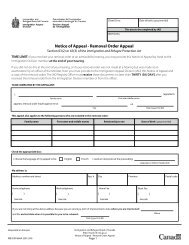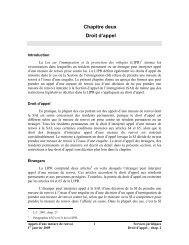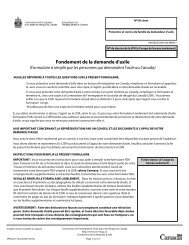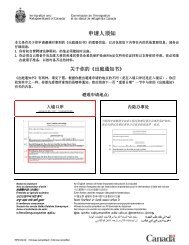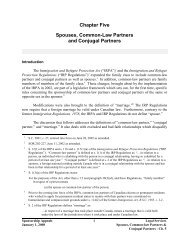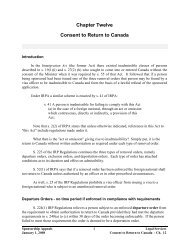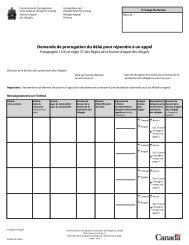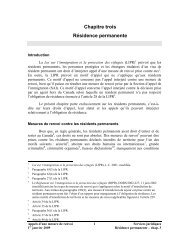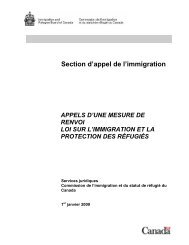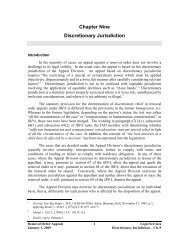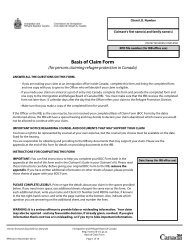Sponsorship Appeals - Chapter 9 - Immigration and Refugee Board ...
Sponsorship Appeals - Chapter 9 - Immigration and Refugee Board ...
Sponsorship Appeals - Chapter 9 - Immigration and Refugee Board ...
You also want an ePaper? Increase the reach of your titles
YUMPU automatically turns print PDFs into web optimized ePapers that Google loves.
<strong>Chapter</strong> NineNon-compliance with the Act or the RegulationsIntroductionUnder IRPA a sponsored member of the family class may be refused a permanent residentvisa if that person does not meet the requirements of the Act or the Regulations (IRPR).Generally speaking a person must be eligible to be sponsored <strong>and</strong> they must be admissible toCanada.As well, the Act <strong>and</strong> Regulations prescribe many additional requirements those personsseeking to become permanent residents through sponsorship must meet. Section 41 of IRPAestablishes a general inadmissibility provision to cover these requirements:s. 41 A person is inadmissible for failing to comply with this Act(a) in the case of a foreign national, through an act or omissionwhich contravenes, directly or indirectly, a provision of this Act;Note as well that s. 2(2) of IRPA states that unless otherwise indicated, references in thisAct to "this Act" include Regulations made under it.A refusal letter 1 must set out with sufficient detail the basis of the refusal. It is necessarytherefore that s. 41(a) is also accompanied by a statutory reference to the specific requirementwhich it is alleged the applicant cannot meet.Some requirements that are commonly not met <strong>and</strong> are likely to lead to a refusal undersubsection 41(a) will be discussed below but this list is not exhaustive.Not an ImmigrantIn the case of parents who are sponsored to Canada for the purpose of settling theirdependent children in Canada <strong>and</strong> who do not intend to remain permanently in Canada, so called"courier parents", the applicable requirement is set out in s. 20(1)(a) of the Act, reproducedbelow:s. 20(1) Every foreign national, … who seeks to enter or remain inCanada must establish,1S. 21(1) IRPA.<strong>Sponsorship</strong> <strong>Appeals</strong> 1 Legal ServicesJanuary 1, 2008 Non-compliance - Ch. 9
(a) to become a permanent resident, that they hold the visa or otherdocument required under the regulations <strong>and</strong> have come to Canadain order to establish permanent residence;…[emphasis added]It should be noted that although the scheme of the Act suggests that this provision mayproperly ground a refusal for such an applicant, IRPA no longer contains the words "immigrant"<strong>and</strong> "l<strong>and</strong>ing" which figured heavily in the reasoning in cases under the former Act.Does the language of s. 20(1)(a) give rise to a requirement on the part of applicants tointend to reside in Canada permanently? The IAD has held that the concept of “courier parent”survives in IRPA in s. 20(1)(a). The panel distinguished between the obligation to maintainpermanent residence in Canada under s. 28 from the requirement of an intent to establishpermanent residence in Canada under s. 20(1)(a) 2 .The balance of this subtopic is based on cases decided under the <strong>Immigration</strong> Act as theymay provide useful guidance for members.IntentionAn applicant for permanent residence must have the requisite intention to residepermanently in Canada. The visa officer will undertake an examination of all of the surroundingcircumstances to determine whether or not such intention exists.Intention can be demonstrated in one of two ways. “It [intention] can be revealed byspeech or conduct.” 3 Generally, the intention of the applicant will become evident during thevisa officer's interview with the applicant in the statements made by the applicant in answer to thevisa officer's questioning. Other times, the finding of no intention will be based on the applicant'sfailure to pursue all of the steps involved in the application process. 4 The visa officer's decisionmay also be founded on evidence of the applicant's past behaviour when he or she had previouslybeen granted permanent resident status, but subsequently lost it. 52345Daliri, Farshid Hafezi v. M.C.I., (IAD TA3-01591), MacDonald, May 6, 2004; [2004] I.A.D.D. No. 210 (QL).Kan, Chak Pan v. M.E.I. (F.C.T.D., no. T-2977-91), Muldoon, March 19, 1992. Reported: Kan v. Canada(Minister of Employment <strong>and</strong> <strong>Immigration</strong>) (1992), 17 Imm. L.R. (2d) 206 (F.C.T.D.).See Villanueva, Antonio Ordonez v. M.E.I. (I.A.B. 85-9741), Benedetti, Weisdorf, Bell, November 12, 1986,where the applicant's failure to respond to the visa officer's request for documentation regarding his separationfrom his wife led the <strong>Immigration</strong> Appeal <strong>Board</strong> to conclude that he was not an immigrant. In Saroya, KuljeetKaur v. M.E.I. (IAD V92-01880), Verma, September 21, 1993, one of the bases for the refusal was that theapplicant disregarded instructions given to her during the processing of the application, as she did not show upfor three scheduled interviews <strong>and</strong> did not respond to some communications. See also Goindi, Surendra Singhv. M.C.I. (IAD T93-10856), Aterman, December 13, 1994, where the applicants had ignored requests for themto undergo medical examinations as was required.In Shergill, Sohan Singh v. M.E.I. (IAD T92-05406), Weisdorf, Chu, Ahara, February 8, 1993, the applicantwas l<strong>and</strong>ed in 1981, but returned to India shortly thereafter, leaving the sponsor <strong>and</strong> a daughter behind. In herpresent application, statements had been made to the visa officer that she wished to remain in Canada for onlysix or seven months, for the purpose of bringing her alleged adopted son to Canada. The applicant's declared<strong>Sponsorship</strong> <strong>Appeals</strong> 2 Legal ServicesJanuary 1, 2008 Non-compliance - Ch. 9
Meaning of “permanently”The ordinary definition of “permanently” connotes something lasting indefinitely.However, this ordinary definition is not applicable within the context of permanent residence.“Permanently” does not mean immutably or forever, or for the applicant's lifetime or anyoneelse's. An intention to leave Canada at some time in the immediate future is not inconsistent withan intention to reside permanently in Canada until then. 6 Nevertheless, “permanently” has theopposite meaning of “temporarily”, <strong>and</strong> an applicant must not be seeking admission to Canadafor a short, fixed period of time for a temporary purpose. 7There are several examples in the case-law of what have come to be known as “courierparents”. In such cases, the panel finds that the purpose of the applicant's immigration to Canadais to facilitate the immigration to Canada of the applicant's accompanying dependent son or67intentions were “strikingly similar” to her behaviour in 1981, <strong>and</strong> therefore it was reasonable to conclude thatshe had no intention to reside permanently in Canada. See also: Patel, Mohamed v. M.E.I. (IAD T91-03124),Weisdorf, Ahara, Fatsis, April 15, 1993, where the panel considered the applicants' past actions as one of thefactors in assessing their intentions in the current applications; Saroya, supra, footnote 4; <strong>and</strong> Sidhu, GurdevSingh v. M.E.I. (IAD V92-01678), Singh, November 17, 1993. In Gill, Jagjit Singh v. M.C.I. (IAD V95-00365), McIsaac, May 8, 1997, the applicant lost his permanent residence status after residing in Canada foronly seven months in a 12-year period. For each request for a returning resident permit he gave a differentreason, none of which appeared to be the real reason for his extended stay in India. It was not established on abalance of probabilities that he intended to reside permanently in Canada.Toor, Joginder Singh v. M.E.I. (F.C.A., no. A-310-82), Thurlow, Heald, Verchere, February 15, 1983.Reported: Re Toor <strong>and</strong> Canada (Minister of Employment <strong>and</strong> <strong>Immigration</strong>) (1983), 144 D.L.R. (3d) 554, QL[1983] F.C.J. 114 (F.C.A.). In Dhaul, Paramjit Kaur v. M.E.I. (I.A.B. 86-6004), Chambers, March 5, 1987, the<strong>Immigration</strong> Appeal <strong>Board</strong> held that a person may still be an “immigrant” for the purposes of the <strong>Immigration</strong>Act even though the person is undecided as to whether or not he or she will wish to remain in Canada afteradmission. In Sarwar, Abida Shaheen v. M.C.I. (IAD T93-11195), Ariemma, Leousis, Muzzi, April 24, 1995,the panel agreed that establishing permanent residence in Canada does not imply that the applicant is barredfrom returning to his or her homel<strong>and</strong>. In this case, if the appellant had established that the applicant genuinelyrequired to return to Pakistan to attend to personal or family matters, the panel would have had no difficulty infinding that he was a genuine immigrant, “irrespective of how many times or when he intended to travel to hiscountry”. In Sanghera, Rajwinder Kular v. M.C.I. (IAD V96-01527), Clark, February 17, 1998, the panelaccepted the applicants’ testimony at the hearing that they always intended to reside permanently in Canada butdid plan to visit India sometimes. In response to the visa officer’s question about when he would return toIndia, the principal applicant said a year or two. He was asked whether he intended to be a permanent residentof Canada, to which he replied in the negative. The CAIPS notes revealed that the officer did not explain whatit meant to be a “permanent resident”. The answers given to the officer's questions were consistent with theapplicants not knowing whether or not permanent residents are allowed to leave Canada for any reason.In Mirza, Shahid Parvez v. M.E.I. (I.A.B. 86-9081), Teitelbaum, Weisdorf, Townshend, December 1, 1986, the<strong>Immigration</strong> Appeal <strong>Board</strong> held that an applicant who intended to come to Canada for only a temporary periodof time was not an immigrant. In Gill, Shivinder Kaur v. M.C.I. (IAD T94-06519), Wright, May 16, 1995, thepanel held that the applicant’s statement that he would return to India if he did not like Canada was notunreasonable <strong>and</strong> did not negate his intention to establish permanent residence in Canada. In Wiredu, Alex v.M.C.I. (IAD T97-00727), Muzzi, December 8, 1997, the panel found that the family members desired areunion, but for a fixed period of time on the part of the principal applicant. The immigration officer’sh<strong>and</strong>written notes revealed that the applicant’s intention was to visit her sons in Canada. As such, she was notmaking an applicant for permanent residence.<strong>Sponsorship</strong> <strong>Appeals</strong> 3 Legal ServicesJanuary 1, 2008 Non-compliance - Ch. 9
daughter <strong>and</strong> that the applicant does not have the requisite intention to reside permanently inCanada as the applicant intends to return to his or her homel<strong>and</strong> after spending a period of time inCanada. 8 The possibility that the applicant might have the requisite intention to residepermanently in Canada at a later time is not sufficient as “[t]his form of deferred intent […] is notcontemplated in the <strong>Immigration</strong> Act.” 9Other factors which have been considered by panels in the determination of whether ornot an intention to reside permanently in Canada exists include the preservation of a family basein the homel<strong>and</strong> 10 <strong>and</strong> the retention of assets abroad. 11MotivationThe relevant issue is whether or not the applicant has the requisite intention to residepermanently in Canada. The motivation behind the applicant's intention is not of itself relevant. 12For example, the <strong>Immigration</strong> Appeal Division held that an applicant's desire to facilitate theentry into Canada of her two unmarried sons did not, in that case, preclude a finding of anintention on the part of the applicant to reside permanently in Canada; therefore, the applicantwas found not to be a “courier parent.” 138910111213See for example: Shergill, supra, footnote 7; Patel, Mohamed, supra, footnote 15; Kala, Bhupinder Kaur v.M.E.I. (IAD T92-09579), Arpin, Townshend, Fatsis, May 18, 1993; Mahil, Tarlochan v. M.E.I. (IAD T92-08178), Weisdorf, Townshend, Ahara, May 18, 1993; Kamara, Abass Bai Mohamed v. M.E.I. (IAD W91-00092), Arpin, February 24, 1994; Brown, Earlyn v. M.C.I. (IAD T93-09712), Ramnarine, August 17, 1994;Gill, Harbans Kaur v. M.C.I. (IAD V92-00694), Lam, March 27, 1996; <strong>and</strong> Dh<strong>and</strong>war, Jatinder Kaur v. M.C.I.(IAD T96-01977), Bartley, June 6, 1997. In Molice, Antoine Anel v. M.E.I. (IAD M93-07976), Dur<strong>and</strong>,March 22, 1994, one of the factors which the panel considered was the sponsor's statement that he did notsponsor his parents in the early 1980s when he could have, as he was waiting until the law would allow him toalso sponsor his siblings, his parents' accompanying dependants. The panel held that if the applicants were not“courier parents”, there would have been no reason for the sponsor to have waited for the law to change beforesponsoring them; as well, the sponsor could not have known or predicted that the law would be changed in thefuture. Cherfaoui, Azzedine Dino v. M.C.I., (IAD MA1-01747), Beauchemin, February 11, 2002 (reasonssigned February 13, 2002).Sarwar, supra, footnote 6. Ha, Byung Joon v. M.C.I. (IAD TA0-04969), Sangmuah, October 3, 2001 (reasonssigned January 8, 2002).Deol, Dilbag Singh v. M.E.I. (I.A.B. 80-6012), Campbell, Hlady, Howard, February 11, 1981.Pacampara, Enrique P<strong>and</strong>ong v. M.E.I. (I.A.B. 85-9684), Ariemma, Arkin, De Morais, April 10, 1987; Ruhani,Zahida v. M.C.I. (IAD T92-07177), Teitelbaum, Muzzi, B<strong>and</strong>, March 8, 1995; <strong>and</strong> Lalli, Kulwinder v. M.C.I.(IAD V94-01439), Lam, November 20, 1995. See however Gill, Shivinder Kaur, supra, footnote 7, wherethere was evidence that the retention of the family home was a cultural norm <strong>and</strong> that in any event, theapplicant offered a plausible explanation when he said that he didn’t want to sell the home so that the familycould have accommodation when they returned to India to visit relatives. In Dhiman, Jasvir Kaur v. M.C.I.(IAD V95-00675), McIsaac, May 27, 1996, one basis for the refusal was that the applicants’ societal traditionswere such that parents lived with their sons (married or not), <strong>and</strong> not with their married daughters; theapplicants applied to go <strong>and</strong> live with their married daughter in Canada, while their eldest son remained inIndia. This basis was not accepted, however, <strong>and</strong> the refusal was found to be invalid in law.Aquino, Edmar v. M.E.I. (I.A.B. 86-9403), Eglington, Weisdorf, Ahara, August 13, 1986.Ruhani, supra, footnote 11.<strong>Sponsorship</strong> <strong>Appeals</strong> 4 Legal ServicesJanuary 1, 2008 Non-compliance - Ch. 9
TimingIn appeals where the issue is whether or not the applicant is an immigrant, the question oftiming arises: that is, at what point in time must the applicant have had the requisite intention toreside permanently in Canada? In Kahlon 14 , the Federal Court of Appeal held that the<strong>Immigration</strong> Appeal <strong>Board</strong> (the predecessor to the <strong>Immigration</strong> Appeal Division) had to decidethe appeal on the basis of the law as it stood at the time of the hearing of the appeal because thehearing before the <strong>Board</strong> was a hearing de novo. If one applies Kahlon, where the refusal isbased on the applicant's not being an immigrant, the panel would determine the applicant'sintention as of the date of the hearing. However, there has been some conflicting case-law in thisarea.In Patel, Manjulaben, it was held that a determination should be made of the applicant'sintention at the time that the applicant made his or her application for permanent residence sinceit is a jurisdictional question. 15 However, more recently, <strong>Immigration</strong> Appeal Division panelshave not followed Patel on the timing issue, <strong>and</strong> have instead relied on Kahlon <strong>and</strong> held that theapplicant's intention to establish permanent residence in Canada must be determined as of thetime of the hearing. 16 In Ampoma 17 , the majority applied Kahlon <strong>and</strong> held that intention must beassessed at the time of the hearing. The dissenting member specifically refused to follow thedecision in Patel. 18In Quadri, the <strong>Immigration</strong> Appeal Division stated that the burden of proof on a sponsoris to prove that either the visa officer erred in finding that there was no intention to immigrate at1415161718Kahlon, Darshan Singh v. M.E.I. (F.C.A., no. A-115-86), Mahoney, Stone, MacGuigan, February 6, 1989.Reported: Kahlon v. Canada (Minister of Employment <strong>and</strong> <strong>Immigration</strong>) (1989), 7 Imm. L.R. (2d) 91 (F.C.A.).Patel, Manjulaben v. M.E.I. (IAD T89-03915), Townshend, Weisdorf, Chu, April 20, 1990 (leave to appealrefused July 16, 1990); see infra, for a discussion on jurisdiction. Patel was applied by the majority in Uddin,Mohammed Moin v. M.E.I. (IAD T91-02394), Chu, Ahara, Fatsis (dissenting), August 28, 1992.Gnanapragasam, Dominic Gnanase v. M.C.I. (IAD T99-11000), Whist, December 4, 2000.Ampoma, Eric Sackey v. M.E.I. (IAD W91-00008), Gill<strong>and</strong>ers, Verma, Wlodyka (dissenting), February 10,1992. Reported: Ampoma v. Canada (Minister of Employment <strong>and</strong> <strong>Immigration</strong>) (1992), 17 Imm. L.R. (2d)219 (IAD).See also Dh<strong>and</strong>war, supra, footnote 8; R<strong>and</strong>hawa, Baljeet Singh v. M.C.I. (IAD V95-01361), Lam, July 23,1996; <strong>and</strong> the dissenting reasons in Uddin, supra, footnote 15. In Sanghera, Charan Singh v. M.E.I. (IAD V93-00595), Verma, December 9, 1993, the panel held that at the time of the hearing, the applicant wanted to livepermanently in Canada; his contrary intention at the time of the interview was due to stress <strong>and</strong> shock onaccount of his mother's death <strong>and</strong> his brother's recent suicide in Canada. Similarly, in Sidhu, supra, footnote 5,the panel held that any statements that the father may have made about returning to India were due to hisemotional stress at the time. In Mallik, Azim v. M.C.I. (IAD T94-04692), Aterman, September 8, 1995, theapplicant’s responses at the interview suggested that she did not intend to reside permanently in Canada; theAppeal Division accepted the appellant’s explanation that the applicant was under stress as a result of the wayin which the interview was conducted, <strong>and</strong> that she had become flustered; it also accepted the explanation thatthe applicant was not sophisticated. See also Sanghera, Avtar Singh v. M.C.I. (IAD V93-02360), Singh,July 22, 1994 <strong>and</strong> Khanna, Sadhana Kumari v. M.C.I. (IAD T96-01555), Wright, June 3, 1996. But see Gill,Harbans Kaur, supra, footnote 8, where the panel considered the applicants’ statements at the time of theirinterview to be more credible <strong>and</strong> trustworthy than their affidavits made subsequent to the refusal, finding thatthe affidavits were “clearly a self-serving attempt to correct earlier statements”.<strong>Sponsorship</strong> <strong>Appeals</strong> 5 Legal ServicesJanuary 1, 2008 Non-compliance - Ch. 9
the time of the interview, or alternatively, that the intention to immigrate arose after the interview<strong>and</strong> was present at the time of the hearing of the appeal. 19FairnessThere is a general duty of procedural fairness which governs visa officers in theirprocessing of sponsored applications for l<strong>and</strong>ing. The issue has sometimes arisen with respect toan applicant’s intention to reside permanently in Canada. A sponsor may challenge the validity ofa refusal on the basis that there was a breach of the principles of natural justice, namely the denialof a fair hearing; such an argument is based on the decision in Pangli 20 . In that case, the Courtheld that the immigration officer had a duty to clear up conflicting statements made by theapplicant on the same day. In both Rahman <strong>and</strong> Dory 21 , the <strong>Immigration</strong> Appeal Division heldthat the applicant was never given an opportunity to answer supplementary questions allowingher to clarify contradictory statements regarding her intention to reside permanently in Canada.Furthermore, the immigration officer who interviewed the applicant should have been theone who actually refused the application; 22 this principle was satisfied where one immigrationofficer interviewed <strong>and</strong> made a recommendation to refuse the application, <strong>and</strong> another officercountersigned the recommendation <strong>and</strong> signed the refusal letter.Pangli has also been applied to support the principle that a visa officer has the duty toexplain to the applicant the difference between permanent resident <strong>and</strong> visitor status, <strong>and</strong> toexplain the possible negative impact of any statutory declaration signed by the applicant whichattests to the applicant's intention not to reside permanently in Canada. 231920212223Quadri, Fatai Abiodun v. S.S.C. (IAD T93-12576), Hopkins, September 30, 1994.Pangi v. Canada (Minister of Employment <strong>and</strong> <strong>Immigration</strong>) [1987] F.C.J. No. 1022. For a fuller discussion offairness, see <strong>Chapter</strong> 11, “Fairness <strong>and</strong> Natural Justice under IRPA”.Rahman, Mohibur v. M.C.I. (IAD M94-05434), Angé, March 3, 1995; Dory, Roosevelt v. M.C.I. (IAD M94-03745), Angé, December 19, 1995. In Sian, Malkit Kaur v. M.C.I. (IAD V95-00955), McIsaac, January 20,1997, the panel stated that the visa officer had a duty to clear up the conflict between her conclusion that theapplicants did not intend to reside permanently in Canada <strong>and</strong> their contrary intention inherent in theirapplication for permanent residence. The visa officer had arrived at her conclusion based on the applicant’sresponses at the interview; what was needed was “a further questioning…thereby affording him the opportunityto state finally, <strong>and</strong> unequivocally, what his intention was insofar as coming to Canada was concerned”.This principle was applied in Gill, Rajwinder Kaur v. M.E.I. (IAD V91-00898), Arpin, July 26, 1993.See, for example, Rodriguez, Meliton v. M.E.I. (IAD T91-00107), Weisdorf, Fatsis, Ariemma, August 8, 1991,where the panel applied Pangli <strong>and</strong> held that if at the interview the applicant indicated a desire to come toCanada as a visitor, the choice of a visitor visa rather than a permanent resident visa should have been put toher; there was no evidence that such a choice had been given to the applicant; Merius, Ronald v. M.E.I. (IADM93-05810), Angé, June 13, 1994; <strong>and</strong> Quadri, supra, footnote 19 <strong>and</strong> M.C.I. v. Gough, Glen Patrick (IADTA0-1561), MacAdam, March 26, 2001 where the respondent had signed a voluntary declaration ofab<strong>and</strong>onment of Canadian permanent resident status <strong>and</strong> h<strong>and</strong>ed over his Canadian record of l<strong>and</strong>ing inunexpected circumstances <strong>and</strong> at a moment of intense sleep deprivation. The panel held that he could not befaulted for having singed it without an actual intention to ab<strong>and</strong>on Canada as his place of permanent residence.<strong>Sponsorship</strong> <strong>Appeals</strong> 6 Legal ServicesJanuary 1, 2008 Non-compliance - Ch. 9
Failure to answer truthfully or provide documentsUnder the Regulations to the <strong>Immigration</strong> Act, s. 9(3) provided a basis for a visa officer torefuse a visa for failure to provide information needed to assess both eligibility <strong>and</strong> admissibilityof an applicant. At a de novo <strong>Immigration</strong> Appeal Division hearing the applicant may haveprovided a reasonable explanation or lawful excuse for the default <strong>and</strong> the refusal would nolonger be lawful. If an appeal was allowed in law or on a discretionary basis, care was to be takenthat the visa officer had the information needed to determine eligibility <strong>and</strong> admissibility whenprocessing of the application re-commenced after the appeal. A similar scheme has been enactedin IRPA.Where an applicant has answered questions in the application or at an interview whichanswers have turned out to be false, a refusal has been tied to the duty to answer questionstruthfully. In IRPA this requirement is set out in those provisions that govern the making anapplication of any kind:s. 16(1) A person who makes an application must answer truthfullyall questions put to them for the purpose of the examination <strong>and</strong>must produce a visa <strong>and</strong> all relevant evidence <strong>and</strong> documents thatthe officer reasonably requires.An applicant for permanent residence would seem to be covered by the duty in thisprovision. They must provide adequate proof of both eligibility (e.g. relationship to sponsor) <strong>and</strong>admissibilityThe failure to answer questions truthfully may also give rise to a separate inadmissibilityfinding under s. 40(1)(a) of IRPA, i.e. misrepresentation, which may have the effect of barringthe foreign national from Canada for two years. This is dealt with in more detail in <strong>Chapter</strong> 8.Failure to undergo a medical examinationThis has been dealt with in <strong>Chapter</strong> 3 on medical inadmissibility. See comments above asto continuing obligation to provide proof of admissibility.Discretionary JurisdictionThe general category of inadmissibility described in s. 41(a) is designed to ensure allapplicants undergo a thorough <strong>and</strong> detailed process of examination to ensure they meet therequirements of the Act <strong>and</strong> regulations. A refusal may be challenged as unlawful or a sponsormay seek special relief from the requirement <strong>and</strong> produce a sufficient evidentiary basis for theapplicant to be relieved of the challenged requirement. The integrity of the immigration systemmust be examined against the particular circumstances supporting the request for special relief.<strong>Sponsorship</strong> <strong>Appeals</strong> 7 Legal ServicesJanuary 1, 2008 Non-compliance - Ch. 9
CASESAmpoma, Eric Sackey v. M.E.I. (IAD W91-00008), Gill<strong>and</strong>ers, Verma, Wlodyka (dissenting),February 10, 1992. Reported: Ampoma v. Canada (Minister of Employment <strong>and</strong> <strong>Immigration</strong>)(1992), 17 Imm. L.R. (2d) 219 (IAD) ....................................................................................................................... 5Aquino, Edmar v. M.E.I. (I.A.B. 86-9403), Eglington, Weisdorf, Ahara, August 13, 1986 .......................................... 4Brown, Earlyn v. M.C.I. (IAD T93-09712), Ramnarine, August 17, 1994.................................................................... 4Cherfaoui, Azzedine Dino v. M.C.I., (IAD MA1-01747), Beauchemin, February 11, 2002 (reasonssigned February 13, 2002)......................................................................................................................................... 4Daliri, Farshid Hafezi v. M.C.I., (IAD TA3-01591), MacDonald, May 6, 2004; [2004] I.A.D.D.No. 210 (QL)............................................................................................................................................................. 2Deol, Dilbag Singh v. M.E.I. (I.A.B. 80-6012), Campbell, Hlady, Howard, February 11, 1981. .................................. 4Dh<strong>and</strong>war, Jatinder Kaur v. M.C.I. (IAD T96-01977), Bartley, June 6, 1997.......................................................... 4, 5Dhaul, Paramjit Kaur v. M.E.I. (I.A.B. 86-6004), Chambers, March 5, 1987. ............................................................. 3Dhiman, Jasvir Kaur v. M.C.I. (IAD V95-00675), McIsaac, May 27, 1996. ................................................................ 4Dory, Roosevelt v. M.C.I. (IAD M94-03745), Angé, December 19, 1995..................................................................... 6Gill, Harbans Kaur v. M.C.I. (IAD V92-00694), Lam, March 27, 1996................................................................... 4, 5Gill, Jagjit Singh v. M.C.I. (IAD V95-00365), McIsaac, May 8, 1997.......................................................................... 2Gill, Rajwinder Kaur v. M.E.I. (IAD V91-00898), Arpin, July 26, 1993 ...................................................................... 6Gill, Shivinder Kaur v. M.C.I. (IAD T94-06519), Wright, May 16, 1995. ................................................................ 3, 4Gnanapragasam, Dominic Gnanase v. M.C.I. (IAD T99-11000), Whist, December 4, 2000....................................... 5Goindi, Surendra Singh v. M.C.I. (IAD T93-10856), Aterman, December 13, 1994 .................................................... 2Gough: M.C.I. v. Gough, Glen Patrick (IAD TA0-1561), MacAdam, March 26, 2001............................................... 6Ha, Byung Joon v. M.C.I. (IAD TA0-04969), Sangmuah, October 3, 2001 (reasons signed January8, 2002) ..................................................................................................................................................................... 4Kahlon, Darshan Singh v. M.E.I. (F.C.A., no. A-115-86), Mahoney, Stone, MacGuigan,February 6, 1989. Reported: Kahlon v. Canada (Minister of Employment <strong>and</strong> <strong>Immigration</strong>)(1989), 7 Imm. L.R. (2d) 91 (F.C.A.)........................................................................................................................ 5Kala, Bhupinder Kaur v. M.E.I. (IAD T92-09579), Arpin, Townshend, Fatsis, May 18, 1993..................................... 4Kamara, Abass Bai Mohamed v. M.E.I. (IAD W91-00092), Arpin, February 24, 1994................................................ 4Kan, Chak Pan v. M.E.I. (F.C.T.D., no. T-2977-91), Muldoon, March 19, 1992. Reported: Kan v.Canada (Minister of Employment <strong>and</strong> <strong>Immigration</strong>) (1992), 17 Imm. L.R. (2d) 206 (F.C.T.D.)............................. 2Khanna, Sadhana Kumari v. M.C.I. (IAD T96-01555), Wright, June 3, 1996 .............................................................. 5Lalli, Kulwinder v. M.C.I. (IAD V94-01439), Lam, November 20, 1995...................................................................... 4Mahil, Tarlochan v. M.E.I. (IAD T92-08178), Weisdorf, Townshend, Ahara, May 18, 1993. ..................................... 4Mallik, Azim v. M.C.I. (IAD T94-04692), Aterman, September 8, 1995. ...................................................................... 5Merius, Ronald v. M.E.I. (IAD M93-05810), Angé, June 13, 1994............................................................................... 6Mirza, Shahid Parvez v. M.E.I. (I.A.B. 86-9081), Teitelbaum, Weisdorf, Townshend, December 1,1986........................................................................................................................................................................... 3<strong>Sponsorship</strong> <strong>Appeals</strong> 8 Legal ServicesJanuary 1, 2008 Non-compliance - Ch. 9
Molice, Antoine Anel v. M.E.I. (IAD M93-07976), Dur<strong>and</strong>, March 22, 1994. .............................................................. 4Pacampara, Enrique P<strong>and</strong>ong v. M.E.I. (I.A.B. 85-9684), Ariemma, Arkin, De Morais, April 10,1987........................................................................................................................................................................... 4Pangi v. Canada (Minister of Employment <strong>and</strong> <strong>Immigration</strong>) [1987] F.C.J. No. 1022 ................................................. 6Patel, Manjulaben v. M.E.I. (IAD T89-03915), Townshend, Weisdorf, Chu, April 20, 1990....................................... 5Patel, Mohamed v. M.E.I. (IAD T91-03124), Weisdorf, Ahara, Fatsis, April 15, 1993. ........................................... 2, 4Quadri, Fatai Abiodun v. S.S.C. (IAD T93-12576), Hopkins, September 30, 1994...................................................... 6Rahman, Mohibur v. M.C.I. (IAD M94-05434), Angé, March 3, 1995. ........................................................................ 6R<strong>and</strong>hawa, Baljeet Singh v. M.C.I. (IAD V95-01361), Lam, July 23, 1996.................................................................. 5Rodriguez, Meliton v. M.E.I. (IAD T91-00107), Weisdorf, Fatsis, Ariemma, August 8, 1991. .................................... 6Ruhani, Zahida v. M.C.I. (IAD T92-07177), Teitelbaum, Muzzi, B<strong>and</strong>, March 8, 1995............................................... 4Sanghera, Avtar Singh v. M.C.I. (IAD V93-02360), Singh, July 22, 1994.................................................................... 5Sanghera, Charan Singh v. M.E.I. (IAD V93-00595), Verma, December 9, 1993........................................................ 5Sanghera, Rajwinder Kular v. M.C.I. (IAD V96-01527), Clark, February 17, 1998..................................................... 3Saroya, Kuljeet Kaur v. M.E.I. (IAD V92-01880), Verma, September 21, 1993 ...................................................... 2, 2Sarwar, Abida Shaheen v. M.C.I. (IAD T93-11195), Ariemma, Leousis, Muzzi, April 24, 1995............................. 3, 4Shergill, Sohan Singh v. M.E.I. (IAD T92-05406), Weisdorf, Chu, Ahara, February 8, 1993................................... 2, 4Sian, Malkit Kaur v. M.C.I. (IAD V95-00955), McIsaac, January 20, 1997 ................................................................. 6Sidhu, Gurdev Singh v. M.E.I. (IAD V92-01678), Singh, November 17, 1993 ............................................................. 2Toor, Joginder Singh v. M.E.I. (F.C.A., no. A-310-82), Thurlow, Heald, Verchere, February 15,1983. Reported: Re Toor <strong>and</strong> Canada (Minister of Employment <strong>and</strong> <strong>Immigration</strong>) (1983),144 D.L.R. (3d) 554, QL [1983] F.C.J. 114 (F.C.A.)................................................................................................ 3Uddin, Mohammed Moin v. M.E.I. (IAD T91-02394), Chu, Ahara, Fatsis (dissenting), August 28,1992........................................................................................................................................................................... 5Villanueva, Antonio Ordonez v. M.E.I. (I.A.B. 85-9741), Benedetti, Weisdorf, Bell, November 12,1986........................................................................................................................................................................... 2Wiredu, Alex v. M.C.I. (IAD T97-00727), Muzzi, December 8, 1997 ........................................................................... 3<strong>Sponsorship</strong> <strong>Appeals</strong> 9 Legal ServicesJanuary 1, 2008 Non-compliance - Ch. 9


